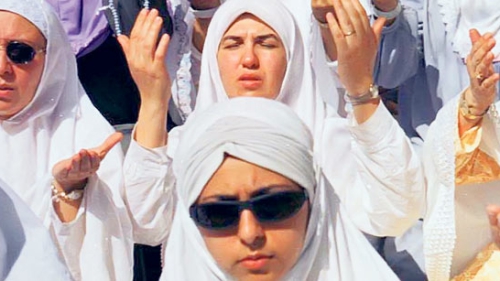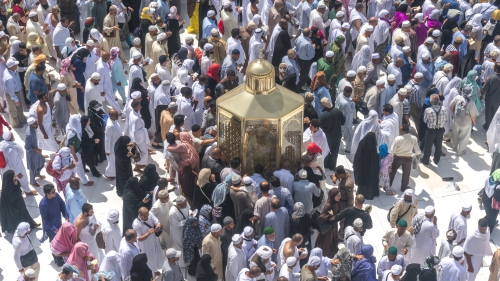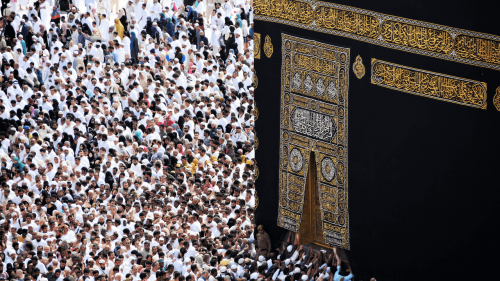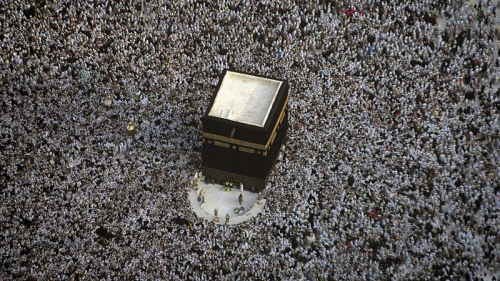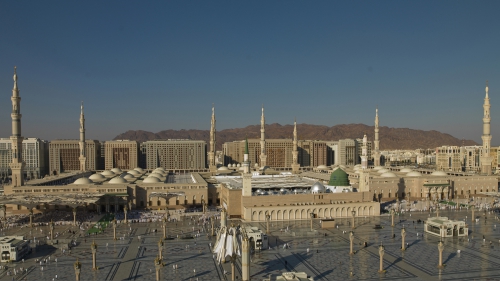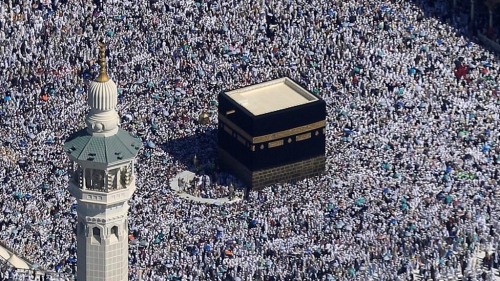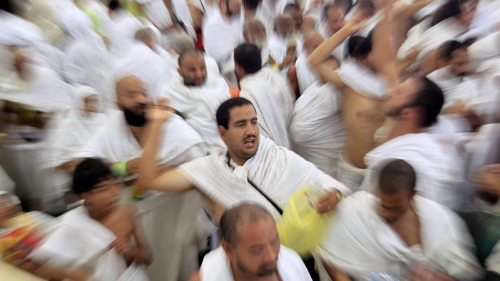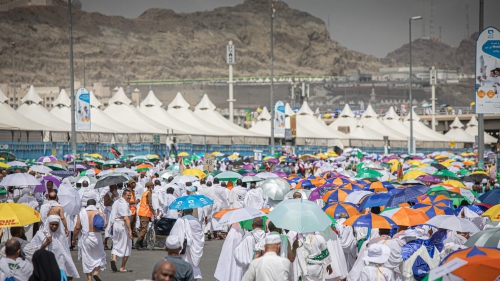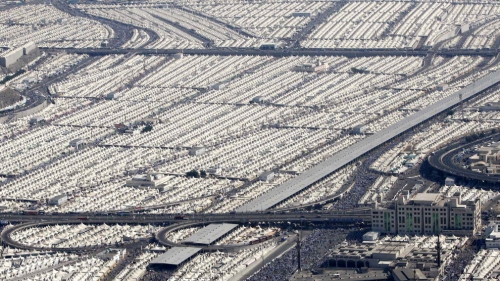My Journey Inside Kaa'ba
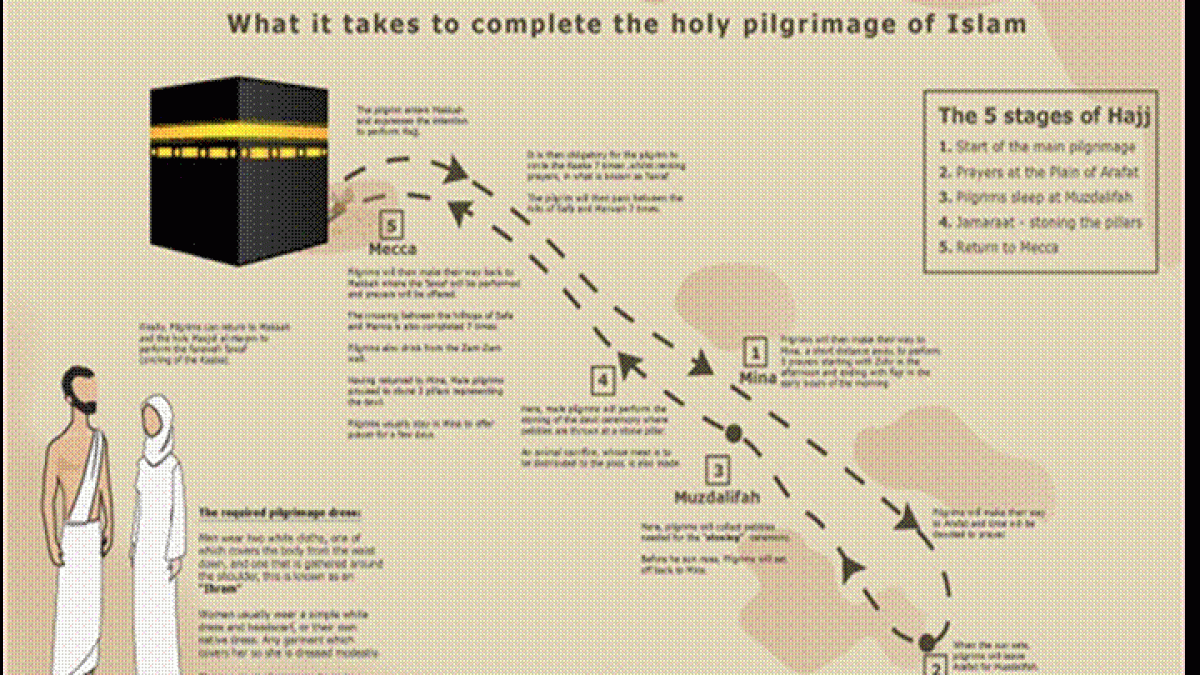
The Hajj, or pilgrimage to Makkah is one of the five pillars of Islam, and a central duty of Islam which origin back to Prophet Abraham and must be carried out by all able-bodied Muslims who can afford to do so at least once in their lifetime. For 14 centuries, countless millions of Muslims, men and women from the four corners of the earth, have made the pilgrimage to Makkah, the birthplace of Islam.
Abdullah ibn Umar (may Allah be pleased with him) quoted the Prophet (peace and blessings be upon him) as saying: "Islam has been built on five [pillars]: testifying that there is no god but Allah and that Muhammed is the Messenger of Allah, performing the prayers, paying the zakah, making the pilgrimage to the House, and fasting in Ramadan." (Al-Bukhari and Muslim)
Abu Hurairah (may Allah be pleased with him) narrated that he heard Prophet (peace and blessings be upon him - pbuh) say: "Whoever performs Hajj and does not commit any obscenity or transgression shall return [free from sins] as he was on the day his mother gave birth to him." (Al-Bukhari)
The Hajj pilgrimage occurs from the 8th to 12th Dhu al-Hijjah, the last month of the Islamic calendar.
Hajj pilgrimage and the house of Allah is mentioned in various places in Qur'an, some of the verses are listed below:
Hajj is [during] well-known months, so whoever has made Hajj obligatory upon himself therein [by entering the state of ihram], there is [to be for him] no sexual relations and no disobedience and no disputing during Hajj. And whatever good you do - Allah knows it. And take provisions, but indeed, the best provision is fear of Allah. And fear Me, O you of understanding. (Surat Al-Baqarah, verse 197)
Indeed, the first House [of worship] established for mankind was that at Makkah - blessed and a guidance for the worlds. (Surat 'Ali `Imran, verse 96)
In it are clear signs [such as] the standing place of Abraham. And whoever enters it shall be safe. And [due] to Allah from the people is a pilgrimage to the House - for whoever is able to find thereto a way. But whoever disbelieves - then indeed, Allah is free from need of the worlds. (Surat 'Ali `Imran, verse 97)
And [mention, O Muhammad], when We designated for Abraham the site of the House, [saying], "Do not associate anything with Me and purify My House for those who perform Tawaf and those who stand [in prayer] and those who bow and prostrate. (Surat Al-Haj, verse 26)
And [mention] when We made the House a place of return for the people and [a place of] security. And take, [O believers], from the standing place of Abraham a place of prayer. And We charged Abraham and Ishmael, [saying], "Purify My House for those who perform Tawaf and those who are staying [there] for worship and those who bow and prostrate [in prayer]." (Surat Al-Baqarah, verse 125)
Inside Kaa'ba
Alhamdulillah, after attending Hajj this year, I had a real honour for being invited to visit inside Kaa'ba during the Kaa'ba washing ceremony to be held on 15 Muharram 1435H (18 November 2013). I immediately knew that this will be my life's most moving spiritual experience. I started to recount what good deed I may have performed in the past that Allah gave me this unique opportunity. I often wondered if my good luck may not have been for my good deeds, but a blessing from my great grandmother for the care and support she received from my father during her hour of need. Before, I describe my journey, I should mention the historical significance of "Kaa'ba and its Keepers".
The elements of the Hajj trace back to the time of Prophet Ibrahim (Abraham) who was ordered by Allah to build the Kaa'ba for worship which he built with the help of his son Ismael. Prophet Abraham built Kaa'ba for devout worship to one Allah. He told the people that this was a symbolic house of Allah and Allah did not live here. One of the pagans named Amr ibn Luhay introduced paganism in Mecca and people started filling the Kaa'ba with idols. They congregated to Kaa'ba annually and worshipped their personal gods.
Centuries later during the time of Qusai ibn Kilab, the leader of the Quraish tribe in Makah, the Kaa'ba was made taller with a roof and a quadrangle wall around it to give it the shape of a sanctuary. Qusai was the direct descendent of prophet Abraham through Ismael. He was the great-grandfather of Shaiba ibn Hashim (Abdul-Muttallib), thus the great-great-great-grandfather of the Prophet Muhammad.
In time, Qusai distributed the responsibilities of taking care of Kaa'ba as well as providing the food, water and looking after the pilgrims and cleaning to his sons. His son Abd Manaf was given the (Saqaya) responsibility of providing Zamzam water to the pilgrims while his son Abd ad-Dar was given the (Sadana) responsibility of taking care of Kaa'ba and retain the keys of the Kaa'ba.
Over 4000 years later, the last of the line of prophets, Prophet Muhammad entered Makkah triumphantly, and went inside the Kaa'ba and, with the help of his cousin (and son in law) 'Ali bin abi Talib, destroyed all the idols of Kaa'ba with their own hands. The Prophet of Islam was reciting the Verse from the Qur'an:
And say, "Truth has come, and falsehood has perished. Indeed is falsehood, [by nature], ever bound to perish." (Surat Al-'Isra', verse 81)
Prophet Mohammed then asked Usman bin Talha (the descendent of Abd ad-Dar at that time) to handover the Kaa'ba keys. At that time, Hazrat Abbas (R.A) asked to be given the Sadana responsibility as he already had the Saqaya responsibility. The Prophet did not reply and went inside Kaa'ba to pray. And then Angel Jibreel (Gabriel) came down with a verse and revealed inside the Kaa'ba.
Indeed, Allah commands you to render trusts to whom they are due and when you judge between people to judge with justice. Excellent is that which Allah instructs you. Indeed, Allah is ever Hearing and Seeing. (Surat An-Nisa', verse 58)
Soon as that verse was revealed, Prophet Muhammad returned the key to Usman bin Talha and said:
"Take it, O Bani Talha, eternally up to the Day of Resurrection, and it will not be taken from you unless by an unjust, oppressive tyrant"
It was the miracle of Quran that upon revealing that verse up until now the key of the Kaa'ba is still with the family of Usman bin Talha (the Shaibi family) for 15 centuries. Even today, the kings and the most powerful men in the world have all had to bow to the words of the Prophet and ask permission from the Shaibi family before they can enter the Kaa'ba.
My Journey
I received an invitation pass the previous night from the Makkah Emir mentioning the date and the protocols for the Kaa'ba washing event scheduled for Monday, 18 November, I was also told to be present at Al-Mukabbariya (the place in Haram where they call for prayers) at 4:30 am. I decided to be there at 3:30 am and pray Tahajjud. The feeling was intense not believing that I will be actually going inside Kaa'ba.
After Fajr prayers, we had to queue up with dignitaries and patiently wait our turn. The first stop was Rukun al Yamani where we made dua, after that we kissed and prayed at Hajr Aswad and then made our way to the entrance gate of Kaa'ba. The gate doors are made of gold doors weighing approx. 300 kg. The gate was approx. 7 feet above ground and we used a temporary wooden staircase. At the gate, we were greeted by the current keeper of the keys Sheikh Abdul Qadir Al Shaibi. He welcomed wholeheartedly as I kissed him on his forehead and thanked him for this wonderful opportunity.
The first thing that struck me as I entered the gate was the size of the interior the Kaa'ba. The single hall (approx. 8m x 10m x 13m) inside looked quite impressive, with perfect dimensions and had an immediate calming effect.
The hall was supported by 3 wooden pillars with gold capping. The interior walls were of beige marble with green marble borders. There were numerous stone and marble inscriptions in Arabic adorning the side walls presumably very old and placed by the past kings and important people. The ceiling was covered with finely designed green cloth.
There was a smaller door (named Bab al Taubah) on the far right wall which is now permanently closed. Bab al Taubah was used in the past as an exit door.
There were people presumably from the Shaibi family cleaning with rose, oud and musk perfumes as well using incense. The smell was sublime.
I spent time making dua and then proceeded to pray two raka'ah salaat. The most amazing thing I noticed was that people were praying inside Kaa'ba in all directions. Muslims around the world pray facing Kaa'ba, but inside Kaa'ba you can pray in any direction.
After salaat, I started making dua again and I almost choked with the spiritual emotion of being in the most holy place in the world. I started to imagine the time during Jahiliyyah (the Days of Ignorance), when the Kaa'ba contained hundreds of idols of pagan gods such as Hubal, al-Lat, al-'Uzz and Manat. I also started to imagine when "truth arrived and falsehood perished" and that on this very place prophets and their companions broke the idols and stood and prayed.
I spent approx. 30 mins inside Kaa'ba and was gently asked to make way for others.
I have provided some of my feelings, but they are essentially indescribable. I don't believe anything in life would be a better experience that the one that I just had. I can only say that I have come out a better person and hope that I can be worthy of the opportunity that was given to me. I shall strive to have a higher standard and work towards the betterment of mankind Insha'Allah.
Yusuf Mansuri is a principal consultant at one of the leading institutions of Saudi Arabia. In his role, he is currently working on various project of National importance.
*****
Yusuf Mansuri is a principal consultant at one of the leading institutions of Saudi Arabia. In his role, he is currently working on various project of National importance. He has significant international experience and has taken a number of senior positions in Australia, Asia and the Middle East; leading large projects and teams. He holds a Master of Computer Science, Post Diploma in Computer Applications and a Diploma in Electrical Engineering. Yusuf has also completed work experience at prestigious institutions, such as: Harvard Business School, Sloan School of Management (MIT), Thomas J Watson IBM Lab (New York) , Graduate School of Business (Stanford University) and Anderson Graduate School of Management, UCLA. He originally from India.
Related Suggestions
To begin with, Saudi Arabia is ruled by the west. The people have no freedom. They have been oppressed. The king is just a puppet.The article says "Soon as that verse was revealed, Prophet Muhammad returned the key to Usman bin Talha and said: "Take it, O Bani Talha, eternally up to the Day of Resurrection, and it will not be taken from you unless by an unjust, oppressive tyrant". All the kings,rulers,politicians are oppressors and unjust rulers throughout the WORLD including S.Arabia. So how does the key remained in the original family under the unjust rulers?
JUST A THOUGHT.
Great Article. The story highlights the wonderful history of Allah's justice and its implementation by Muslims for over the last 1400 years.
Mohammed.






